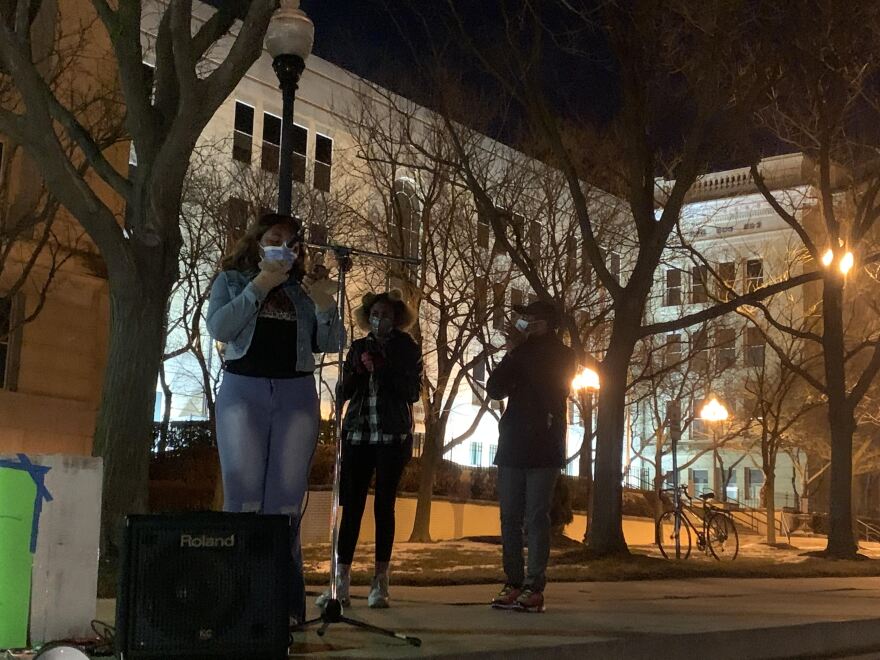Baltimore City Schools CEO Sonja Santelises appeared before the City Council Thursday night to address questions from lawmakers after the district delayed an expansion of in-person learning to better prepare for the return of students.
She and other school administrators have argued that the district has successfully operated 27 schools for more than 2,000 of the city’s most vulnerable students, with only one recorded instance of COVID-19 transmission since late September.
“The reality is that Baltimore City has been opening schools safely, slowly since this past summer,” Santelises said.
Her appearance before the council came a day after the Baltimore Teachers Union staged a caravan protest outside the district’s administration building on North Avenue as some teachers still await vaccinations.
The union and its supporters say the administrators have not been forthcoming with details, nor do they believe that some school buildings that struggled with soap supplies, HVAC issues or running water are safe to reenter.
“We are experiencing a downward trend [in COVID-19 statistics] for the first time in a long time,” Diamonté Brown, president of the BTU, said at the hearing. “If we prematurely expand in-person programming without the necessary full vaccinations, adequate ventilation and a proactive testing plan, we, like a lot of cities, will reverse our gains and expand the pandemic.”
Brown has led the union in demanding that all schools staff be vaccinated, ventilation upgrade work is fully completed and a testing system for asymptomatic teachers and staff is developed before in-person learning is expanded.
Instead of returning in mid-February, as the district originally planned, students in kindergarten through second grade are due to return March 1. Third, fourth, fifth and ninth graders may return March 15. High school seniors may return April 12. The rest of the system’s reopening plans will be announced in March.
The return is optional: parents can choose to have their children continue with online learning.
Before the council, Santelises reiterated her argument for expanding in-person learning: that, when done safely and in accordance with guidance from health experts, it bolsters outcomes across the board for students and families. The district has been following CDC guidelines for schools, which include social distancing, handwashing and distributing PPE.
“Those mitigation techniques have been very successful,” Santelises said. “I was in a kindergarten classroom and I will tell you, the teacher was amazing and she had a routine and a song where young people were learning to make sure they keep their masks on.”
The district also has teamed up with Johns Hopkins University and the University of Maryland Medical Center to provide vaccines for staff. The district has invited more than 5,000 schools staff to receive a vaccine, Santelises said. Nutrition workers, who have staffed meal sites last spring, were the first to receive invitations.
The district’s plan has faced opposition from some members of the council. Kristerfer Burnett, Zeke Cohen and Ryan Dorsey, all progressive Democrats, have asked Santelises to refrain from opening classroom doors until all teachers have been vaccinated.
“If you claim to love our kids, you better move the teachers, too, because that's who takes care of them every day,” Cohen said during the Wednesday night protest. Burnett and Councilwoman Odette Ramos also attended.
A'niya Taylor, a senior at Baltimore City College High School, said the district’s concerns about learning loss pale in comparison to the risks of losing loved ones.
“How can I add integers when I'm risking subtracting my grandmother from the family equation every time I walk into the building?” she said.
“I can reteach content,” said Kendall Casas, an 11th grade teacher at Digital Harbor High School. “But I can't reverse the damages of someone dying or losing a loved one or ongoing health conditions that are a result of COVID.”
Casas says she is proud of the safe space she’s cultivated for students in her classroom. But, she said, she can no longer promise that to her students if there’s any possibility they could be exposed to the virus and become ill or infect loved ones.
Her biggest concern is proper ventilation. Months before the shutdown, Casas said, the HVAC system at her school building failed. She said she filed maintenance requests for two months before it was addressed.
“It got looked at and they said, ‘That's a district problem. You have to ask North Ave.’ It never got fixed,” Casas said. “So if an HVAC system is already failing before a deadly pandemic that spreads through the air, I don't have confidence.”
Jonathan Collins, city schools’ Assistant Director of Mechanical Services and Engineering, said the district has performed air-monitoring tests at different school buildings and developed ventilation plans for each of them.
The district has obtained 8,300 air purifiers in each classroom, he said, adding that a ventilation dashboard that tracks air quality in each classroom will be launched soon.
Like every teacher that spoke at both hearing and protest, Casas is unequivocally clear: she is desperate to return to the classroom. But, along with the union, only when she feels it’s safe for everyone.
“I don't want any of my students or any of my students' families or myself or my colleagues to have to choose between their job or education and their life," Casas said.
Kelly Carideo, the principal of Beechfield Elementary School in Southwest Baltimore, has operated an in-person learning center for more than 50 families since the fall. The center has not had a single COVID case, she said at the hearing.
She attributed the lack of spread to strict adherence to CDC guidelines.
“Families were grateful, because they shared that the relationships with their scholars was failing due to the constraints of not being able to support virtual learning,” Carideo said.
Reentering the classroom also gave students who were struggling with social and emotional challenges an outlet, she said.
As a parent with children in the school system, Carideo said she understood the fear of the unknown.
But “if families choose to send their babies to be with me, I will continue to hold all stakeholders, staff members and scholars accountable to follow CDC guidelines to make learning safe, fun and as optimal as possible during these very uncertain times,” she said.





